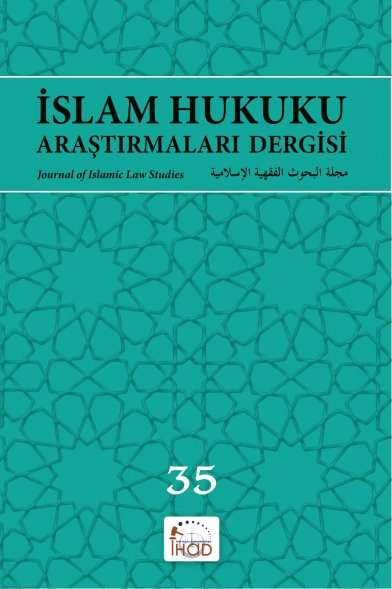Mütekellimîn Metodunu Takip Eden Usûlcülerin Hüsün-Kubuh Anlayışının Ceza Hukukunun Kanunilik İlkesi Açısından Değerlendirilmesi
Fıkıh usûlünün hüsün-kubuh meselesinde fiillerin, iyilik ve kötülük vasfını taşıyıp taşımadığını ve sadece beşerî akılla varılan bu iki değerden dolayı kişinin hukukî sorumluluk altına girip girmediği incelenmektedir. Mütekellimîn metodunu benimseyen usûlcüler, beşerî aklın fiillerdeki birtakım değerleri idrak edebileceğini, buna karşılık insanın vahiyden bağımsız bir şekilde aklı sayesinde iyi veya kötü olduğunu anladığı fiillere karşılık hukukî sorumluluk taşımadığını savumaktadır. Konumuz gereği bu usûlcülerin hüsün ve kubha ilişkin görüşlerini “Kanunsuz suç olmaz.” ve “Kanunsuz ceza olmaz.” tarzında tezahür eden suç ve cezanın kanuniliği ilkesi bağlamında irdeledik. Bu usûlcüler, dünyada övgü veya yergiyi; ahirette sevap veya ceza gerektiren anlamdaki hüsün ve kubhun aklî olmadığını, ancak şer‘î bildirimden sonra fiillerin bu iki değeri haiz olduğunu, bu yüzden hüsün ile kubhun tabiatı itibariyle fiillerin sıfatı olmadığını söylemektedir. Bu takdirde bir fiil, kendisi ile ilgili Şâriden bir bildirim geldikten sonra hukuken iyidir veya kötüdür. Bir fiil, kişi tarafından işlenmeden önce kanunun o fiili suç sayması suç ve cezanın kanuniliği ilkesini sağladığı gibi yargılama ve cezalandırmada keyfiliği de önlemektedir. Bu çalışmada suç ve cezanın kanunilik ilkesinden hareketle ilahî tebliğ gelmeden önce Allah’a inanmak dâhil insana hiçbir mükellefiyetin yüklenemeyeceği, dolayısıyla insanın fiillerinin sevap gerektirmesinin veya fiillerine ceza terettüp edilmesinin söz konusu olamayacağı sonucuna vardık.
Anahtar Kelimeler:
slam Hukuku, Ceza Hukuku, Hüsün, Kubuh, Kanunilik İlkesi
Evaluation of the al-Husn wa al-Qubh Understanding of Mutakallimun Usul Scholars in Terms of the Legality Principle of Criminal Law
In this study, it is examined whether the actions of the Islamic jurisprudence methodology have the qualities of good and evil in the issue of good and evil and whether the person has a legal responsibility due to these two values that are reached only with human reason. The methodologists of the Mutakallimin movement argue that the human mind can perceive some values in the actions put forward, whereas it does not bear legal responsibility for acts that it understands to be good or bad regardless of divine revelation. As per our subject, their views on good and evil are “No crime without law.” and “No punishment is unlawful.” We examined it within the context of the lawfulness of the crime and punishment. These methodologists use praise or satire in the world. In the hereafter, they say that good and bad deeds in the sense that require reward or punishment are not rational, but that the deeds contain these two values after they are declared in the context of Shariah, so good and evil are not the nature of actions. For, they are of the opinion that human actions have the quality of good and evil in this sense only when they are reported in the context of Sharia. In this sense, an action is legally good or bad after receiving a statement from the transmitter about it. Before an action is committed by a person, the law provides the criterion that the crime and punishment are in compliance with the law, and it also prevents arbitrariness in judgment and punishment. In this study, based on the principle of compliance with the law of crime and punishment, we came to the conclusion that no responsibility can be attributed to human beings, including believing in God, before the divine messages arrive, therefore, it is out of question for human actions to require rewards or punish them.
Keywords:
Islamic Law, Criminal Law, al-Husn, al-Qubh, Legality Principle,
- ISSN: 1304-1045
- Yayın Aralığı: Yılda 2 Sayı
- Başlangıç: 2004
- Yayıncı: Gençleri Evlendirme ve Mehir Vakfı
Sayıdaki Diğer Makaleler
Kıyas İşleminde İllet Birliğinin Sağlanamaması Hali: Kıyâs Ma‘a’l-Fârık
Akit Hürriyetinin Kur’ânî Dayanakları
Mâlikî Fakihi İbnü’l-Kassâr’ın Hayatı, Eserleri ve Usûl Görüşleri
Mekke’de Bir Osmanlı Fakihi: Yazma Nüshalara Göre Pîrîzâde İbrahim’in Hayatı, Şahsiyeti ve Eserleri
Zarûrî Küllî Maslahatların/Makâsıdın Adedi Üzerine Bir Değerlendirme
Eş‘arî Usûlcülerin Nesih Konusunda İmam Şâfiî’ye Yönelttiği Eleştiriler -Râzî ve Âmidî Örneği-
İslam Hukukunun Roma Hukukundan Etkilendiği Tezinin Tarihi Süreci
